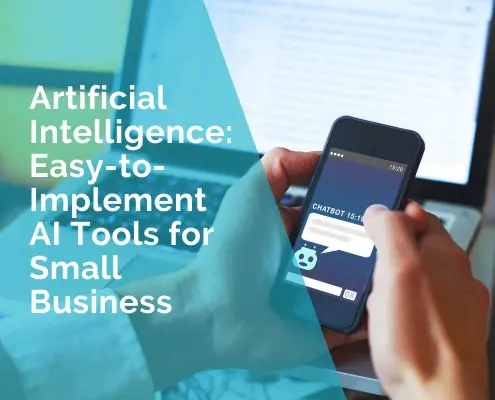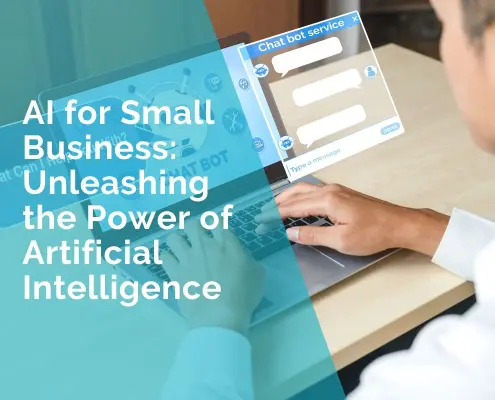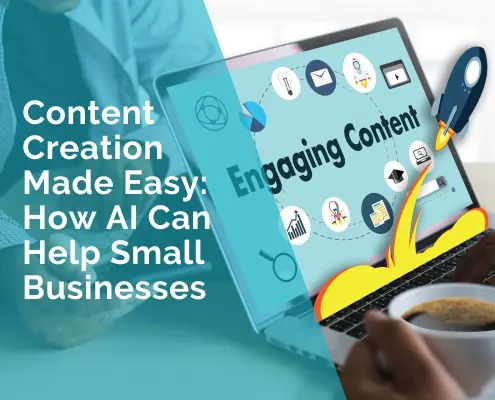Selecting AI Solutions and Providers
Choosing the right AI solutions and providers is a critical step in the implementation process.
Consider the following factors when evaluating AI solutions:
Features and Capabilities
Assess the features and capabilities of AI solutions to ensure they align with your business needs. Look for solutions that offer the specific functionalities required for your intended AI applications.
Scalability and Flexibility
Consider whether AI solutions can scale alongside your business growth and adapt to changing requirements. This is particularly important for small businesses aiming for long-term success.
Integration and Compatibility
Evaluate the compatibility of the AI solutions with your existing systems and infrastructure. Seamless integration with your technology stack will facilitate smooth implementation and minimize disruptions.
Reputation and Support
Research the reputation and customer reviews of AI solution providers. Look for providers with a track record of delivering reliable and effective AI solutions. Additionally, consider the level of customer support and training provided by the vendors.
Choosing the Right AI Tools and Technologies
Selecting the right AI tools and technologies is crucial for successful implementation. Consider the specific needs of your business and explore different AI solutions available in the market. The table below showcases popular AI tools and their applications:
AI Tool |
Application |
| Natural Language Processing (NLP) | Chatbots, sentiment analysis, language translation |
| Machine Learning | Predictive analytics, customer segmentation |
| Computer Vision | Image recognition, object detection |
| Speech Recognition | Voice-enabled virtual assistants |
Pilot Testing and Evaluation
Conduct a pilot test of the chosen AI solution to assess its effectiveness and suitability for your business. Collect feedback from users, evaluate performance metrics, and identify areas for improvement.
In the case of evaluating different AI solutions during the pilot phase, consider the following criteria
Accuracy
This measures the precision and correctness of the AI solution’s predictions or outcomes.
User Satisfaction
This represents the level of user satisfaction with the AI solution. It can be measured through user feedback, surveys, or ratings.
Implementation Time
This indicates the time taken to implement the AI solution successfully.
Cost
This represents the overall cost associated with implementing and maintaining the AI solution.
Overcoming Barriers and Challenges
Implementing AI in small businesses may come with certain barriers and challenges. By proactively addressing these challenges, businesses can ensure a smoother implementation process. Here are some common barriers and ways to overcome them:
Cost
AI implementation may involve upfront costs, including acquiring AI tools, hiring experts, and training employees. To overcome this challenge, consider starting with small-scale implementations or leveraging cost-effective AI solutions tailored for small businesses.
Data Quality and Accessibility
Poor data quality or lack of accessible data can hinder AI implementation. Focus on data quality improvement efforts, ensure data accessibility, and consider data augmentation techniques if necessary.
Skills and Knowledge Gap
Lack of AI expertise within the organization can be a challenge. Consider partnering with AI consultants or hiring data scientists to bridge the skills gap. Training existing employees on AI fundamentals can also be beneficial.
Resistance to Change
Employees may resist adopting AI due to fear of job displacement or unfamiliarity with new technologies. To address this, emphasize the benefits of AI in improving job efficiency, reducing repetitive tasks, and creating new opportunities for employees.
Ethical Considerations
AI implementation raises ethical concerns such as data privacy, algorithm bias, and transparency. Ensure compliance with relevant regulations and implement ethical guidelines for AI usage to build trust with customers and stakeholders.
By addressing these barriers and challenges, small businesses can navigate the implementation process more effectively and maximize the benefits of AI adoption.
Remember, each small business is unique, and the challenges they face may vary. Assess your specific circumstances, seek expert advice when needed, and develop a customized approach to address the barriers and challenges in implementing AI.

Full-Scale Implementation
Once the pilot testing is successful, proceed with the full-scale implementation of AI in your small business. Develop a detailed implementation plan, allocate resources, and train employees on utilizing AI tools effectively. Consider the following table to outline the implementation plan:
Implementation Step |
Responsible Personnel |
Timeline |
| Data integration | IT Team | Month 1 |
| Model development | Data Scientists/Developers | Months 2-3 |
| Employee training | HR and Training Department | Months 3-4 |
| Deployment and monitoring | IT Team/Project Manager | Months 4-5 |
| Evaluation and Fine Tuning | Data Scientists/Project Manager | Months 6-7 |
| Maintenance and Support | IT Team | Ongoing |
Monitoring and Optimization
After the implementation, regularly monitor the performance of AI systems and collect feedback from users. Continuously optimize the algorithms and models based on new data and evolving business needs. Use the following graph to illustrate the performance optimization:
Scaling and Expansion
As your small business grows, consider scaling and expanding AI implementation to other areas or processes. Analyze the impact of AI on business performance, gather success stories, and explore new AI applications to drive further growth.
AI Tools and Technologies for Small Businesses
A. Cloud-based AI Platforms
Cloud-based AI platforms are powerful tools that help small businesses utilize artificial intelligence (AI) effectively. Think of them as digital workspaces where businesses can access AI services and tools through the internet. In simple terms, it’s like having a virtual AI assistant that can help with various tasks.
What are Cloud-based AI Platforms?
Cloud-based AI platforms are online platforms that provide businesses with AI capabilities without the need for expensive hardware or complex software installations. These platforms offer a range of AI services, such as natural language processing, image recognition, and predictive analytics.
How do Cloud-based AI Platforms Work?
Cloud-based AI platforms work by leveraging the capabilities of the cloud. Just like how you can store your photos or documents in the cloud and access them from anywhere, these platforms allow businesses to access AI tools and services remotely.
Imagine you have a virtual assistant who can analyze customer feedback to understand their preferences. With a cloud-based AI platform, you can upload the feedback to the platform, and it will process the data using advanced AI algorithms. The platform will then provide you with valuable insights and recommendations based on the analysis.
Examples of Cloud-based AI Platforms
Here are some examples of popular cloud-based AI platforms:
- Amazon Web Services (AWS): AWS offers a comprehensive suite of AI services, including Amazon Rekognition for image and video analysis, Amazon Lex for building chatbots, and Amazon Forecast for demand forecasting.
- Microsoft Azure: Azure provides various AI tools and services, such as Azure Cognitive Services for language understanding, Azure Machine Learning for building and deploying models, and Azure Bot Service for creating chatbots.
- Google Cloud Platform (GCP): GCP offers AI tools like Google Cloud Vision for image analysis, Google Cloud Natural Language for text analysis, and Google Cloud AutoML for building custom machine learning models.
Think of cloud-based AI platforms as digital workshops where you can access a wide range of AI tools and services. Just like how a workshop provides different tools for different tasks, these platforms provide businesses with AI capabilities they can use for things like analyzing data, automating processes, or creating chatbots.
Benefits of Cloud-based AI Platforms
Cloud-based AI platforms offer several benefits for small businesses:
- Accessibility: These platforms can be accessed from anywhere with an internet connection, making AI tools available to businesses regardless of their physical location.
- Cost-effectiveness: Small businesses can avoid large upfront costs for hardware or software by using cloud-based platforms. They pay for the services they use, making it more affordable.
- Scalability: Cloud-based platforms can handle large amounts of data and can scale as a business grows. Whether you have a few customers or thousands, the platform can handle the workload.
- Easy Integration: These platforms often offer easy integration with existing systems, allowing businesses to incorporate AI capabilities seamlessly into their operations.
Machine Learning and Deep Learning Frameworks
Machine learning and deep learning frameworks are like special tools that help computers learn and make intelligent decisions, just like how you learn and make decisions by using your brain. Let’s explore what these frameworks are and how they work, using examples and analogies that are easy for a 12-year-old to understand.
What are Machine Learning and Deep Learning Frameworks?
Machine learning and deep learning frameworks are software tools that teach computers how to learn and make predictions or decisions. They provide a set of instructions and techniques that enable computers to analyze data, recognize patterns, and make intelligent choices.
Think of these frameworks as a recipe book for computers. Just like you follow a recipe to bake a cake, these frameworks help computers follow instructions to learn and make predictions based on data.
Examples of Machine Learning and Deep Learning Frameworks
Let’s take a look at some popular examples of machine learning and deep learning frameworks:
- TensorFlow: TensorFlow is like a big box of building blocks that you can use to create different models for tasks like image recognition, speech recognition, and language translation. It’s like having a set of LEGO bricks that you can assemble to build amazing creations.
- PyTorch: PyTorch is similar to a paint palette and canvas. It allows you to create beautiful paintings (models) by providing you with different colours (tools) and a canvas to express your creativity. It’s known for being flexible and easy to use.
- scikit-learn: scikit-learn is like a toolbox filled with various tools that help you solve different problems. It provides ready-to-use algorithms for tasks like classifying objects, predicting outcomes, and clustering similar items. It’s like having a toolbox full of tools to fix things around the house.
Machine learning frameworks are like teachers: Imagine you have a special teacher who learns from examples and then helps you answer questions. They study different examples (data) and use their knowledge to predict answers to new questions. Machine learning frameworks work in a similar way, learning from data and making predictions or decisions based on what they’ve learned.
Deep learning frameworks are like puzzle solvers: Deep learning frameworks are excellent at solving puzzles. Imagine you have a jigsaw puzzle with many pieces. Deep learning frameworks are like puzzle solvers that study the pieces and figure out how they fit together to create a complete picture. They learn by trial and error, finding the best way to fit the pieces together.
Benefits of Machine Learning and Deep Learning Frameworks
Machine learning and deep learning frameworks offer several benefits:
- They help computers learn and make intelligent decisions without being explicitly programmed for every scenario.
- They can analyze large amounts of data quickly and find meaningful patterns or insights.
- They can be used in various fields, such as healthcare, finance, and entertainment, to solve complex problems and make accurate predictions.
Pre-built AI Solutions and APIs
Pre-built AI solutions and APIs are like ready-made tools that small businesses can use to add artificial intelligence (AI) capabilities to their own applications or processes. Let’s explore what these solutions and APIs are and how they can be helpful, using examples and analogies that are easy for a 12-year-old to understand.
What are Pre-built AI Solutions and APIs?
Pre-built AI solutions and APIs are created by experts who have already done a lot of the hard work, so businesses can use them without needing to build everything from scratch.
Imagine you want to build a robot that can clean your room. Instead of starting from scratch and building every part of the robot, you can buy a pre-built robot kit that already has all the necessary pieces. Similarly, pre-built AI solutions and APIs provide businesses with ready-to-use AI capabilities, saving them time and effort.
How do Pre-built AI Solutions and APIs Work?
Pre-built AI solutions and APIs work by providing businesses with specific functions or services that are powered by AI. These functions can be integrated into existing applications or processes to add intelligent features.
For example, let’s say you have a website where people can ask questions. Instead of hiring people to manually answer every question, you can use a pre-built AI solution or API that understands and responds to questions automatically. It’s like having a smart assistant that can answer questions for you.
Examples of Pre-built AI Solutions and APIs
Here are some examples of pre-built AI solutions and APIs that businesses can use:
- Google Cloud Vision API: This API allows businesses to incorporate image recognition capabilities into their applications. For example, a travel company can use it to automatically tag and categorize vacation photos uploaded by users.
- IBM Watson Language Translator: This pre-built solution helps businesses translate text from one language to another. It’s like having a language expert who can instantly translate any text you give them.
- Microsoft Azure Text Analytics: This solution enables businesses to analyze text data and extract valuable insights. For instance, a social media monitoring tool can use this to understand people’s sentiments about a brand by analyzing their social media posts.
Pre-built AI solutions are like magic wands: Imagine you have a magic wand that can instantly perform certain tasks. Pre-built AI solutions are like these magic wands that businesses can use to accomplish specific AI-related tasks without having to build everything from scratch.
APIs are like plug-and-play modules: APIs are like special modules that you can plug into your existing applications or systems. They provide specific functions, just like how you can plug in a game controller to your video game console to play different games.
Benefits of Pre-built AI Solutions and APIs
Using pre-built AI solutions and APIs offers several benefits:
- They save time and effort by providing ready-made AI capabilities that can be easily integrated into existing applications or processes.
- They allow businesses to leverage the expertise of AI specialists without requiring in-depth knowledge or resources to build everything from scratch.
- They enable small businesses to access powerful AI functionalities that would otherwise be challenging or expensive to develop independently.
Natural Language Processing (NLP) Tools
Natural Language Processing (NLP) tools are like super smart language detectives that help computers understand and analyze human language, just like how you understand and interpret what people say. Let’s dive into what NLP tools are and how they work, using examples and analogies that are easy for a 12-year-old to understand.
What are NLP Tools?
NLP tools are special programs or algorithms that help computers understand and work with human language. They are designed to recognize and interpret the meaning behind words, sentences, and even entire documents.
Imagine you have a friend who speaks a different language, and you want to understand what they’re saying. Instead of learning the entire language yourself, you can use an NLP tool that acts as a translator, helping you understand the meaning of their words. NLP tools work in a similar way, but instead of translating between languages, they help computers understand and interpret human language.
How do NLP Tools Work?
NLP tools work by using clever techniques and algorithms to analyze and process human language. They can perform tasks like language translation, sentiment analysis (understanding emotions), and even question answering.
For example, let’s say you have a chatbot on a website that can answer questions about a product. The NLP tool behind the chatbot understands the questions people ask and provides appropriate responses. It’s like having a language expert who can understand any question and provide an accurate answer.
Examples of NLP Tools
Here are some examples of NLP tools that businesses can use:
- Google Cloud Natural Language API: This tool helps businesses analyze and understand the sentiment (positive or negative) in customer reviews or social media posts. It’s like having a program that can read people’s emotions by analyzing their written words.
- Amazon Comprehend: This NLP tool can automatically extract key information from documents or articles. It’s like having a super-fast reader who can scan through a book and tell you all the important details without you having to read the entire book.
- NLTK (Natural Language Toolkit): NLTK is an open-source library that provides various NLP functions, such as text classification and language parsing. It’s like a toolbox filled with tools that can help you understand and analyze different aspects of human language.
NLP tools are like language detectives: Imagine you’re a detective trying to solve a mystery. You gather clues, analyze evidence, and piece together the story. NLP tools act as language detectives, analyzing words and sentences to uncover the meaning and context behind them.
NLP tools are like language superheroes: NLP tools have special powers that enable them to understand and process human language. They can read, translate, and answer questions, just like superheroes with language superpowers.
Benefits of NLP Tools
Using NLP tools offers several benefits:
- They help businesses understand customer sentiments and feedback, allowing them to improve products and services accordingly.
- They automate language-related tasks, saving time and effort in analyzing large volumes of text data.
- They enable businesses to provide better customer support through chatbots or automated question-answering systems.
Robotic Process Automation (RPA)
Robotic Process Automation (RPA) is like having a team of super-efficient robots that can do repetitive tasks for you, just like how you might have seen robots assembling cars in a factory. Let’s explore what RPA is and how it works.
What is Robotic Process Automation (RPA)?
Robotic Process Automation (RPA) is a technology that allows businesses to automate repetitive tasks by using software robots, also known as “bots.” These bots are like digital assistants that follow a set of instructions to perform tasks without needing human intervention.
Imagine you have a big pile of LEGOs that need to be sorted by colour. Instead of manually sorting each piece, you can have a LEGO sorting robot that can quickly identify the colours and sort them into different piles. RPA works similarly, but instead of sorting LEGOs, it automates tasks like data entry, report generation, and data transfer.
How does Robotic Process Automation (RPA) Work?
RPA bots are designed to mimic human actions on a computer. They can navigate through different applications, click buttons, fill out forms, and perform other tasks just like a human would.
For example, let’s say you work in a company where you need to transfer customer information from one system to another. Instead of copying and pasting the data manually, an RPA bot can do it for you. It’s like having a super-fast and accurate assistant who can handle repetitive computer tasks.
Examples of Robotic Process Automation (RPA)
Here are some examples of how RPA can be used in different businesses:
- Invoice Processing: In a retail company, RPA can be used to automatically extract information from invoices, validate the data, and update the company’s financial systems.
- Data Entry: In a healthcare facility, RPA can automate data entry tasks by extracting patient information from forms and entering it into electronic records, saving time and reducing errors.
- Report Generation: In an insurance company, RPA can generate reports by pulling data from different sources, formatting it, and creating the reports without the need for manual intervention.
Benefits of Robotic Process Automation (RPA)
Using RPA offers several benefits:
- It saves time and improves efficiency by automating repetitive tasks, allowing employees to focus on more important and complex activities.
- It reduces errors and improves accuracy since RPA bots can perform tasks with high precision and consistency.
- It increases productivity by completing tasks faster, resulting in quicker turnaround times and improved business operations.
Real-world Examples of AI Adoption in Small Businesses
Case Study 1: AI-powered Customer Support for a Small E-commerce Store
Imagine there’s a small online store called “SuperKids Toys” that sells all kinds of fun toys for kids.
The store receives lots of customer inquiries every day, such as questions about products, shipping, and returns. Handling all these questions manually can be time-consuming and overwhelming for the store owners. That’s where AI-powered customer support comes to the rescue!
SuperKids Toys decided to implement an AI-powered chatbot on their website to help answer customer questions quickly and accurately. This chatbot is like a friendly virtual assistant that can communicate with customers just like a human.
Here’s how it works:
Understanding Customer Questions
When a customer types a question in the chatbox on the website, the AI-powered chatbot uses Natural Language Processing (NLP) to understand the question. It can recognize different words, phrases, and even emojis!
For example, if a customer asks, “Do you have any LEGO sets for 8-year-olds?”, the chatbot understands that the customer is looking for LEGO sets suitable for 8-year-olds.
Providing Helpful Answers
Once the chatbot understands the customer’s question, it uses its built-in knowledge and database to provide accurate and helpful answers. It can give information about product availability, prices, shipping options, and even suggest related products based on customer preferences.
For instance, if the customer asks about the availability of a specific toy, the chatbot can quickly check the inventory and provide an answer like, “Yes, we have 5 of those toys in stock. Would you like to add it to your cart?”
Assisting with Orders and Returns
The AI-powered chatbot can also assist customers with placing orders and handling returns. It can guide customers through the checkout process, help them track their packages, and provide instructions for returning products if needed.
Let’s say a customer wants to return a toy. The chatbot can ask a few questions to understand the reason for the return and provide instructions like, “To return the toy, please pack it securely in the original packaging and contact our support team. They will guide you through the return process.”
By implementing AI-powered customer support, SuperKids Toys experienced some fantastic benefits:
Faster Responses
The chatbot can instantly respond to customer questions, even outside of business hours. Customers don’t have to wait for a human representative to be available.
24/7 Availability
The chatbot is always online and ready to help, allowing customers to get answers to their questions at any time, day or night.
Reduced Workload
With the chatbot handling many inquiries, the store owners have more time to focus on other important aspects of their business, like finding new toys or improving the website.
SuperKids Toys’ customers love the convenience and quick assistance provided by the AI-powered chatbot. They feel supported and have a great shopping experience, which leads to more satisfied customers and increased sales for the small e-commerce store.
Case Study 2: AI-driven Inventory Optimization for a Local Retail Business
Let’s imagine a small local retail store called “Fashion Frenzy.” They sell all kinds of trendy clothes, shoes, and accessories. The store owners always want to make sure they have enough products in stock to meet their customers’ demands, but they also don’t want to have too much inventory that sits on the shelves and doesn’t sell. That’s where AI-driven inventory optimization comes into play!
Fashion Frenzy decided to use AI technology to help them manage their inventory more efficiently. It’s like having a smart helper who knows exactly what items to order and how many to order. Here’s how it works:
Tracking Sales and Trends
The AI system keeps track of all the sales happening in the store. It collects data on which items are selling well and which ones are not as popular. It also looks at trends in fashion to understand what customers are likely to buy in the future.
Predicting Demand
Using the data it has collected, the AI system can make predictions about how many of each item Fashion Frenzy should have in stock. It considers factors like past sales, seasonal trends, and even upcoming events or holidays that might influence customer preferences.
Recommending Order Quantities
Based on its predictions, the AI system recommends the optimal quantities of each product that Fashion Frenzy should order from its suppliers. It helps the store owners make informed decisions about how much inventory to have on hand.
Avoiding Stockouts and Overstocking
The AI system ensures that Fashion Frenzy doesn’t run out of popular items by suggesting timely reorders. It also helps prevent overstocking by alerting the store owners when they are ordering too much of a particular item.
By using AI-driven inventory optimization, Fashion Frenzy experiences several benefits:
Reduced Stockouts
With the help of AI, the store owners can avoid running out of popular products that customers want to buy. This means fewer disappointed customers and more sales for the store.
Efficient Inventory Management
The AI system helps Fashion Frenzy maintain the right balance of inventory. They don’t have too much excess stock that takes up space and ties up their money, nor do they have too little stock that leads to missed sales opportunities.
Improved Profitability
By optimizing their inventory, Fashion Frenzy can increase their profitability. They can avoid unnecessary costs associated with excess inventory and minimize lost sales due to stockouts.
Fashion Frenzy loves using AI-driven inventory optimization because it helps them make smarter decisions about their inventory. They can focus on stocking the items that their customers love, and they no longer have to worry about running out of popular products. This leads to happier customers and a more successful retail business.
Case Study 3: AI-based Marketing Automation for a Small Service Provider
Imagine there’s a business coach named Alex who provides guidance and support to individuals and entrepreneurs looking to improve their business skills.
Alex is passionate about helping clients achieve their goals, but reaching a larger audience can be a challenge. That’s where AI-based marketing automation comes into play!
To expand their reach and connect with more potential clients, Alex decides to implement AI technology to automate their marketing efforts. Here’s how it works:
Targeted Audience Segmentation
The AI system analyzes data about Alex’s clients and potential target audience. It identifies different groups based on factors like industry, business size, and specific challenges they face. This segmentation helps Alex understand their audience better and tailor their marketing messages accordingly.
For example, the AI system might identify one group of clients who are startup founders seeking guidance on launching their businesses, while another group could be established business owners looking to scale their operations. This segmentation allows Alex to create personalized marketing campaigns for each group.
Personalized Content Delivery
Using the audience segmentation data, the AI system helps Alex deliver personalized content to their target audience. It automatically sends out relevant articles, videos, or newsletters to engage potential clients and provide valuable insights.
For instance, if the AI system identifies a potential client who is interested in marketing strategies, it can send them a personalized email with tips and resources specifically focused on marketing. This personalized approach helps Alex build trust and establish themselves as an expert in their field.
Automated Follow-ups
The AI system automates follow-up communication with potential clients. It can send personalized emails or messages to nurture the relationship and keep them engaged with Alex’s coaching services.
For example, if someone downloads a free e-book about business strategies from Alex’s website, the AI system can automatically send them a series of follow-up emails with additional tips, success stories, and offers for coaching sessions. This automated follow-up process helps Alex stay connected with potential clients and convert them into paying customers.
By implementing AI-based marketing automation, Alex experiences several benefits:
Increased Reach
With targeted marketing campaigns and personalized content delivery, Alex can reach a larger audience and connect with potential clients who are genuinely interested in their coaching services.
Enhanced Efficiency
The AI system automates repetitive marketing tasks, allowing Alex to focus on providing high-quality coaching services. They no longer have to spend excessive time manually reaching out to prospects, as the AI system takes care of the initial stages of client engagement.
Improved Conversion Rates
The personalized approach and automated follow-ups help nurture potential clients and build trust over time. This leads to higher conversion rates, as more prospects become paying clients.
Alex loves using AI-based marketing automation because it helps them reach a wider audience, provide personalized content, and automate follow-up communication. They can focus on what they do best – coaching and supporting their clients – while the AI system takes care of marketing tasks.
Benefits and Challenges of AI Adoption for Small Businesses
Increased Efficiency and Productivity
When small businesses adopt AI technology, like using smart machines or computer programs, it can make their work faster and more efficient. Imagine having a super-powered helper by your side, like a robot assistant, that can do tasks quickly and accurately.
Here’s how AI can boost efficiency and productivity for small businesses:
Automation of Repetitive Tasks
AI can take over repetitive tasks that can be time-consuming and boring. For example, imagine a small bakery where the baker spends a lot of time manually writing down orders, counting inventory, and scheduling deliveries. With AI, a smart computer program can automatically handle these tasks, freeing up the baker’s time to focus on baking delicious treats.
Quick Decision Making
AI can process a huge amount of data and provide insights that help businesses make better decisions. For instance, imagine a small clothing store that wants to know which items are selling the most and which ones are not. With AI, the store can analyze sales data and customer preferences to quickly identify popular items and adjust their inventory accordingly. This saves time and ensures the store has the right products available to meet customer demand.
Smart Suggestions and Recommendations
AI can also provide helpful suggestions and recommendations based on patterns and trends. For example, think about a small online store that sells books. With AI, the store can analyze a customer’s browsing and purchase history to recommend other books they might be interested in. This personalized recommendation helps customers find books they’ll love, and it increases sales for the store.
By embracing AI, small businesses can experience several benefits:
Time Saving
AI takes care of repetitive tasks, allowing business owners and employees to focus on more important and creative aspects of their work. This saves time and energy, making the business more productive.
Accuracy and Precision
AI is very good at analyzing data and making calculations without mistakes. This means small businesses can rely on AI to provide accurate information and make precise decisions, leading to better outcomes.
Improved Customer Experience
With AI’s ability to analyze customer data, businesses can understand their customers better and provide personalized experiences. For example, AI can help small businesses remember customer preferences and offer tailored recommendations, creating a positive and customized experience for each customer.
While AI adoption brings many benefits, there are also some challenges to consider:
Cost
Implementing AI technology can involve upfront costs, such as purchasing equipment or hiring specialized professionals. Small businesses need to carefully evaluate the costs and benefits to ensure it aligns with their budget and goals.
Learning Curve
AI technology can be complex, and it may take some time for small business owners and employees to understand how to use it effectively. It’s important to invest in training and support to overcome the learning curve and fully utilize the benefits of AI.
Ethical Considerations
AI raises important ethical questions, such as privacy and fairness. Small businesses should ensure they use AI in a responsible and ethical manner, respecting customer privacy and avoiding biases in decision-making.

Enhanced Decision-Making and Insights
AI can be like having a super-smart friend who helps small businesses make better decisions. It’s like having a special power to see things more clearly and understand what’s going on. Let’s find out how AI enhances decision-making and provides valuable insights:
Analyzing Lots of Information
AI can process a huge amount of information really quickly. It’s like having a super-powered brain that can understand and remember everything. For example, imagine a small restaurant trying to decide what dishes to add to their menu. AI can analyze data about customer preferences, popular food trends, and even the ingredients they have in stock. This helps the restaurant make smart decisions about what dishes to serve, ensuring they are delicious and appealing to customers.
Predicting the Future
AI can use its super-smart abilities to predict what might happen in the future. It’s like having a crystal ball that gives small businesses insights into what might work best for them. For instance, imagine a small toy store that wants to know which toys will be popular during the holiday season. AI can analyze past sales data, trends, and even information about new toy releases to predict which toys will be in high demand. This helps the store make informed decisions about what toys to stock up on and sell.
Finding Patterns and Trends
AI has a special talent for spotting patterns and trends that humans might miss. It’s like having a detective who can uncover hidden secrets in the data. For example, imagine a small clothing boutique trying to figure out which fashion styles are most popular among teenagers. AI can analyze social media posts, fashion magazines, and even online shopping data to find out what’s trendy. This helps the boutique stay ahead of the fashion game and offer the latest styles that teens love.
By using AI for decision-making and insights, small businesses can enjoy several benefits:
Smarter Choices
AI provides small businesses with valuable information and analysis that can guide them in making better choices. This helps them avoid mistakes and make decisions that are more likely to lead to success.
Competitive Advantage
With AI’s ability to uncover trends and predict the future, small businesses can stay ahead of the competition. They can offer products or services that are in demand, attracting more customers and increasing their chances of success.
Understanding Customers
AI helps small businesses understand their customers better. By analyzing customer data, AI can reveal insights about their preferences, behaviours, and needs. This knowledge enables businesses to tailor their offerings and provide a better customer experience.
However, there are also some challenges to consider:
Data Quality
AI relies on good-quality data to make accurate decisions and provide meaningful insights. Small businesses need to ensure they have access to reliable and relevant data to fully benefit from AI.
Interpretation and Human Judgment
While AI can provide insights, it’s important to remember that human judgment is still essential. Small businesses need to interpret the AI-generated information and make decisions based on their own expertise and understanding.
Improved Customer Experience and Engagement
AI can be like a friendly helper that makes customers really happy when they interact with a small business. It’s like having a personal assistant who knows exactly what customers want and makes their experience amazing. Let’s explore how AI improves customer experience and engagement:
Personalized Recommendations
AI can recommend things to customers that they will absolutely love. For example, imagine a small online bookstore. When customers visit the website, AI can analyze their past purchases, browsing history, and interests to suggest books they might enjoy. This makes customers feel special and helps them discover new books they might not have found otherwise.
Faster and More Convenient Service
AI can help small businesses provide quick and convenient service to their customers. For a small pizza delivery business, AI-powered chatbots can take customers’ orders, answer their questions, and provide updates on the delivery status. This saves time and makes the whole process smoother for both the business and the customers.
Better Problem Resolution
AI can be like a problem-solving superhero, quickly resolving customer issues. For a small tech support company, AI-powered virtual assistants can help customers troubleshoot common issues with their devices or software. They can provide step-by-step instructions or even connect the customer to a human support agent if needed. This ensures customers get the help they need efficiently and with fewer frustrations.
By using AI to enhance customer experience and engagement, small businesses can enjoy several benefits:
Happy and Loyal Customers
AI’s personalized recommendations and convenient service make customers feel valued and satisfied. This leads to happier customers who are more likely to come back and recommend the business to others.
Improved Efficiency
AI helps small businesses handle customer inquiries and requests more efficiently. This means faster response times and smoother interactions, which contributes to a positive customer experience.
Enhanced Engagement
With AI’s ability to understand customer preferences, small businesses can engage customers in a more targeted and meaningful way. They can send personalized offers, recommendations, or even create interactive experiences that captivate customers’ attention.
However, there are also some challenges to consider:
Balancing Automation and Human Touch
While AI can provide efficient service, it’s important to maintain a balance between automation and human interaction. Small businesses need to ensure that customers still have the option to speak with a real person when necessary to provide a more personal touch.
Privacy and Trust
AI relies on customer data to provide personalized experiences. Small businesses must handle customer data responsibly and prioritize customer privacy and trust. They should be transparent about how customer data is used and ensure it is protected.
Ethical and Privacy Concerns
When we talk about AI, we also need to think about important things like being fair, respectful, and protecting people’s privacy. Just like superheroes have to use their powers responsibly, AI also needs to be used in a way that respects everyone’s rights and values. Let’s explore some ethical and privacy concerns related to AI in simple terms:
Fairness and Bias
AI systems learn from lots of data, but sometimes that data can have biases or unfairness in it. Imagine an AI used for hiring employees. If the data used to train the AI only includes certain types of people, it may not be fair to others who are equally qualified but from different backgrounds. It’s important to make sure AI is trained with diverse and representative data to avoid unfairness.
Privacy and Data Protection
AI needs data to work, but it’s crucial to protect people’s privacy and keep their personal information safe. It’s like having a secret diary that only you can read and nobody else should have access to. For instance, imagine an AI-powered personal assistant that stores information about your daily routines and preferences. It’s essential to ensure that this data is securely stored and not shared without your consent.
Transparency and Accountability
AI systems can sometimes make decisions that are hard to understand. It’s like a magic trick where you’re not sure how it happened. For example, imagine an AI used for loan approvals. If a loan application is rejected, it’s important for the business to be able to explain why and give the applicant a chance to understand and question the decision. Transparency and accountability mean being able to explain how AI arrived at a decision and being open to review or challenge.
To address these concerns, there are some important actions we can take:
Fairness and Diversity
We need to make sure the data used to train AI systems represents different groups of people. This helps avoid biases and ensures fairness for everyone.
Privacy and Consent
We should only collect and use personal data with people’s permission. It’s important to let them know what data is being collected, how it will be used, and how it will be protected.
Responsible Use
People and businesses using AI should think carefully about the impact their decisions may have on others. They should use AI in a way that respects human rights, promotes equality, and avoids harm.
Oversight and Regulation
Governments and organizations play a crucial role in creating rules and guidelines for the ethical use of AI. This ensures that AI is used responsibly and that everyone’s rights and values are protected.
Future Trends and Opportunities for AI in Small Businesses
Advancements in AI Technology
AI technology keeps getting better and smarter every day, just like how new gadgets and toys become more powerful and exciting. Here are some cool things to look forward to:
Smarter AI Assistants
Imagine having an AI assistant that can understand and talk to you just like a real person. It’s like having a robot friend who can help you with all sorts of tasks and answer your questions.
Robots with AI
Robots are becoming smarter and more capable with AI. They can do things like cleaning, delivering packages, or even assisting in hospitals. It’s like having a robot buddy who can help out around the house or in other places.
AI-driven Personalization and Customer Experience
In the future, AI will make our shopping and online experiences even more amazing and personalized. It’s like having a personal shopper who knows exactly what you like:
Tailored Recommendations
AI will be able to suggest things that match your preferences perfectly. For example, when you’re shopping online for clothes, AI can show you outfits that match your style and size.
Customized Experiences
AI will help businesses create unique and interactive experiences just for you. It’s like going to an amusement park where every ride is customized based on your favourite things.
AI and Predictive Analytics for Small Business Growth
AI will help small businesses grow and succeed by using smart predictions and insights. It’s like having a crystal ball that can tell you what might happen in the future:
Smart Business Decisions
AI will analyze lots of data and give small businesses advice on things like pricing, inventory, and marketing strategies. It’s like having a wise mentor who guides you in making the best decisions for your business.
Spotting Trends
AI will be able to identify trends and patterns in the market. It can help small businesses stay ahead of the game and offer products or services that people will love.
AI-enabled Cybersecurity for Small Businesses
As technology advances, so do the ways that bad people try to harm our computers and steal our information. But AI will be there to protect us, like a superhero guarding our online world:
Detecting Threats
AI can detect and stop cyberattacks before they cause harm. It’s like having a security guard who keeps an eye out for any sneaky hackers trying to break into your computer.
Smart Defense
AI can learn from past attacks and adapt its defences to new threats. It’s like having a shield that gets stronger and smarter with each battle.
Recommendations for Small Businesses Embarking on AI Journey
Start Small and Focus on Quick Wins
When it comes to AI, it’s best to start small and take one step at a time, just like learning a new game or skill:
Identify Specific Goals
Figure out what you want to achieve with AI in your business. It could be improving customer service, increasing sales, or streamlining processes. Start with a specific goal in mind.
Pilot Projects
Begin with small AI projects that can deliver quick wins. It’s like playing a game level that you know you can beat. This will help you learn and build confidence in using AI.
Foster a Culture of AI Adoption and Learning
To make AI a success in your business, it’s important to create an environment where everyone is excited about learning and using AI, just like being part of a team:
Educate and Train
Provide training and resources for your employees to understand AI concepts and how they can contribute. It’s like having a coach who helps you learn new strategies in a game.
Encourage Innovation
Foster a culture that embraces innovation and encourages employees to explore AI opportunities. It’s like being on a team that encourages trying out new moves and tactics.
Collaborate with AI Experts and Peers
Don’t be afraid to seek help and learn from others who have experience with AI. It’s like having teammates who have played the game before:
Engage AI Experts: Consult with AI experts or seek guidance from consultants who can help you navigate the AI landscape. It’s like having a coach who can give you tips and strategies to improve your game.
Network with Peers: Join industry groups or communities where you can connect with other small businesses adopting AI. It’s like joining a team where you can share experiences and learn from each other.
Stay Updated with AI Trends and Developments
AI is constantly evolving, so it’s important to stay informed about the latest trends and developments. It’s like following updates and patches in a video game:
Read and Research
Stay updated by reading articles, blogs, and books about AI. It’s like exploring the game’s strategy guide to discover new tips and tricks.
Attend Events
Participate in conferences, webinars, or workshops focused on AI. It’s like attending a game tournament where you can learn from the best players and strategize with others.
The future of AI in small business is incredibly promising. As technology advances, AI will continue to evolve and provide even more innovative solutions. It will become increasingly accessible, affordable, and user-friendly, empowering small businesses to thrive in the digital age.
It’s important for small business owners and entrepreneurs to stay curious, open-minded, and adaptive to embrace the potential that AI offers. By keeping an eye on emerging trends, learning from others, and seeking opportunities to implement AI strategically, small businesses can position themselves for long-term success.
In conclusion, AI is a game-changer for small businesses. By harnessing its power, businesses can unlock new levels of efficiency, decision-making, customer experience, and growth. Embrace AI, explore its possibilities, and get ready to transform your small business into a thriving success story.
Frequently Asked Questions about AI For Small Business
What is AI?
AI stands for Artificial Intelligence. It refers to computer systems that can perform tasks that typically require human intelligence, such as learning, reasoning, and problem-solving.
How can AI benefit small businesses?
AI can benefit small businesses by increasing efficiency, improving decision-making, enhancing customer experience, automating processes, and providing valuable insights.
Is AI only for large corporations?
No, AI is not limited to large corporations. Small businesses can also leverage AI technologies and solutions to improve their operations and gain a competitive edge.
What are some practical AI applications for small businesses?
Some practical AI applications for small businesses include content creation, customer support chatbots, personalized marketing campaigns, inventory optimization, fraud detection, and predictive analytics.
How can AI help with customer support?
AI-powered chatbots can provide instant responses to customer queries, freeing up human agents to handle more complex issues. This improves response times and enhances the overall customer support experience.
Can AI help with sales and marketing?
Yes, AI can automate sales and marketing processes, analyze customer data to provide personalized recommendations, optimize advertising campaigns, and identify potential leads.
What are the challenges of implementing AI in a small business?
Some challenges include limited budget and resources, lack of AI expertise, data quality and privacy concerns, and the need to educate employees about AI.
Do I need technical skills to implement AI in my small business?
While technical skills can be helpful, there are user-friendly AI tools and platforms available that require minimal technical expertise. Some AI solutions are designed specifically for non-technical users.
How can small businesses get started with AI?
Small businesses can start by identifying specific goals, exploring AI solutions relevant to their industry, experimenting with pilot projects, and seeking guidance from AI experts or consultants.
Are there affordable AI solutions for small businesses?
Yes, there are affordable AI solutions tailored for small businesses. Cloud-based AI platforms, pre-built AI models, and open-source tools provide cost-effective options for implementing AI.
Can AI replace human employees in small businesses?
AI is designed to complement human workers, not replace them. It can automate repetitive tasks and assist employees in making better decisions, freeing up their time for more meaningful work.
Is AI secure for small businesses?
AI systems can be designed with security measures to protect sensitive data. However, it’s important to ensure proper cybersecurity practices and address potential vulnerabilities to maintain data security.
How can AI help with inventory management?
AI can analyze historical sales data, predict future demand, and optimize inventory levels to prevent overstocking or stockouts. This ensures efficient inventory management and reduces costs.
Can AI improve the accuracy of sales forecasting?
Yes, AI algorithms can analyze historical sales data, market trends, and other variables to generate more accurate sales forecasts. This helps small businesses plan inventory, resources, and sales strategies more effectively.
Are there AI tools for small businesses to analyze customer behaviour?
Yes, there are AI tools that can analyze customer behavior, preferences, and purchase history to generate valuable insights. This helps small businesses personalize marketing efforts and improve customer engagement.
How can AI help with cybersecurity for small businesses?
AI can identify patterns and anomalies in network traffic, detect potential security breaches, and help in preventing cyber attacks. It can also automate security measures and strengthen the overall cybersecurity framework.
Can AI help small businesses with financial management?
Yes, AI can assist with financial management tasks such as invoice processing, expense tracking, and cash flow analysis. AI-powered tools can automate these processes, reducing manual errors and providing real-time insights into the financial health of the business.
Can AI help small businesses in generating content?
Absolutely! AI can be used to generate content such as blog posts, social media updates, and product descriptions. Natural Language Processing (NLP) algorithms can analyze existing content and generate new content that aligns with the brand’s tone and style.
How can AI improve small businesses’ marketing campaigns?
AI can optimize marketing campaigns by analyzing customer data, identifying target audience segments, and tailoring personalized messages. It can also automate tasks like A/B testing, campaign optimization, and lead nurturing.
Is AI technology expensive for small businesses?
The cost of AI technology varies depending on the complexity and scale of implementation. However, there are affordable AI solutions and platforms available specifically designed for small businesses. These solutions offer flexible pricing models and can deliver significant returns on investment.
Remember, as technology advances, AI becomes more accessible and user-friendly for small businesses. It’s important to carefully assess your business needs, explore suitable AI solutions, and consider consulting with AI experts or service providers to ensure a successful AI implementation.
 Ivana Katz from Websites 4 Small Business is an award winning web designer who builds websites that build your business. She provides unbeatable web design services to fit your budget.
Ivana Katz from Websites 4 Small Business is an award winning web designer who builds websites that build your business. She provides unbeatable web design services to fit your budget.
The end result? Professional, custom-made sites that give your business the extra oomph it needs to stand out from the competition and make an impact.
Whether you’re a brand-new business or an established one ready to improve your digital presence, Ivana makes it easy to get your business online very quickly. Her websites are professional, tailored to fit your budget, and give your business a serious boost.
Download your FREE copy of “Ultimate Website Design Secrets Blackbook – 10 Bulletproof Strategies for Designing an Outrageously Successful Website”












